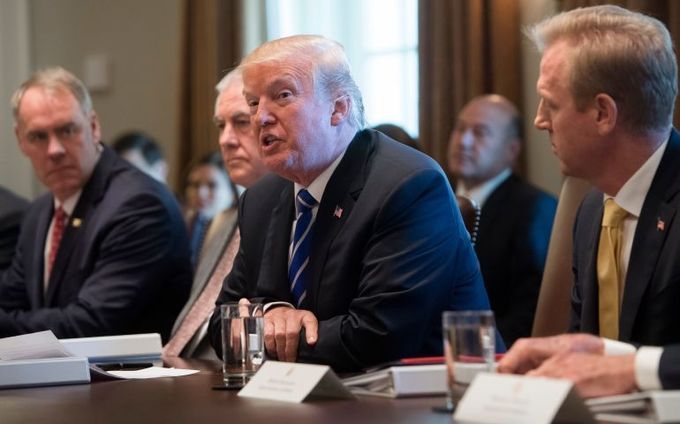Posted on : Nov.22,2017 16:00 KST
Modified on : Nov.24,2017 21:29 KST
 |
|
US President Donald Trump presides over a cabinet meeting at the White House on Nov. 20. At this meeting, Trump announced that North Korea would be relabeled a state sponsor of terrorism. (AP/Yonhap News)
|
On Nov. 20, the US government under President Donald Trump put North Korea back on the list of state sponsors of terrorism after an absence of nine years. In addition, Song Tao, the head of the International Liaison Department of the Communist Party of China (CPC), was unable to meet North Korean leader Kim Jong-un on his visit to the North as the special envoy of Chinese President Xi Jinping. It is worrying to see the Korean Peninsula slipping back into a situation of extreme conflict and tensions after hopes that Trump’s trip to Asia and Xi’s assignment of a special envoy to the North might usher in a phase of dialogue.
The reasons that Trump offered for redesignating North Korea as a state sponsor of terrorism are that it is threatening the entire world with nuclear devastation and that it has repeatedly supported international terrorism, exemplified by carrying out an assassination in foreign territory. Trump also promised to put further sanctions on the North Korean individuals and organizations, signaling an acceleration of the “maximum pressure” campaign.
Our concern is that the US’s redesignation of North Korea will not so much pressure the Kim regime into returning to the table for negotiations as it will provide the North with an excuse for additional nuclear weapon and missile provocations. Many experts in the US and South Korea are critical of this decision, which they regard as shutting the door on dialogue. Questions are also being raised about its effectiveness. Since North Korea is already under wide-ranging sanctions from the US and the international community, including the UN, the sanctions resulting from redesignation might pack less of a punch than expected.
There are also some logical gaps in North Korea’s redesignation. One reason given by the US for the redesignation is the assassination of Kim Jong-nam, but that was more of a purge or a domestic political squabble, which does not line up with the typical concept of terrorism. It also does not meet the conditions for designation as a state sponsor of terrorism as stipulated by the US State Department, namely providing support to terrorist organizations in the areas of planning, training, transportation and materials; providing them direct or indirect financial support; and repeatedly supporting international terrorism.
Ultimately, Trump’s announcement appears to have been aimed at stigmatizing North Korea and was likely motivated by the hardline attitude toward North Korea that is prevalent in the US. This can be deduced simply from the fact that Trump mentioned the death of Otto Warmbier during his announcement of North Korea’s redesignation, even though the two issues are unrelated.
North Korea is also largely responsible for the deteriorating situation. During the summit on Nov. 9, the US and China reportedly agreed to sound out North Korea’s willingness to negotiate by sending Sung Tao as a special envoy. The reason that the Trump administration temporarily delayed its announcement of North Korea’s redesignation — a decision that had already been made — was so that Song could assess North Korea’s willingness to engage in dialogue. But Kim Jong-un’s refusal to even meet Song can only be seen as confirming the North’s resolve to keep moving toward the completion of its nuclear armament through additional nuclear weapons and missile provocations.
China also has lost some of its room to maneuver as a mediator. Essentially, efforts to resolve the situation on the Korean Peninsula have been weakened, while the obstacles have been strengthened. This also greatly increases the pressure on the South Korean government with the Pyeongchang Winter Olympics on their way. Even in this situation, we hope that the government will remain patient and not lose its balance. The government must not stop trying to persuade the Trump administration to keep military tensions from rising and to lead North Korea to the “arena of exchange,” even if only on a limited basis.
Please direct questions or comments to [english@hani.co.kr]






